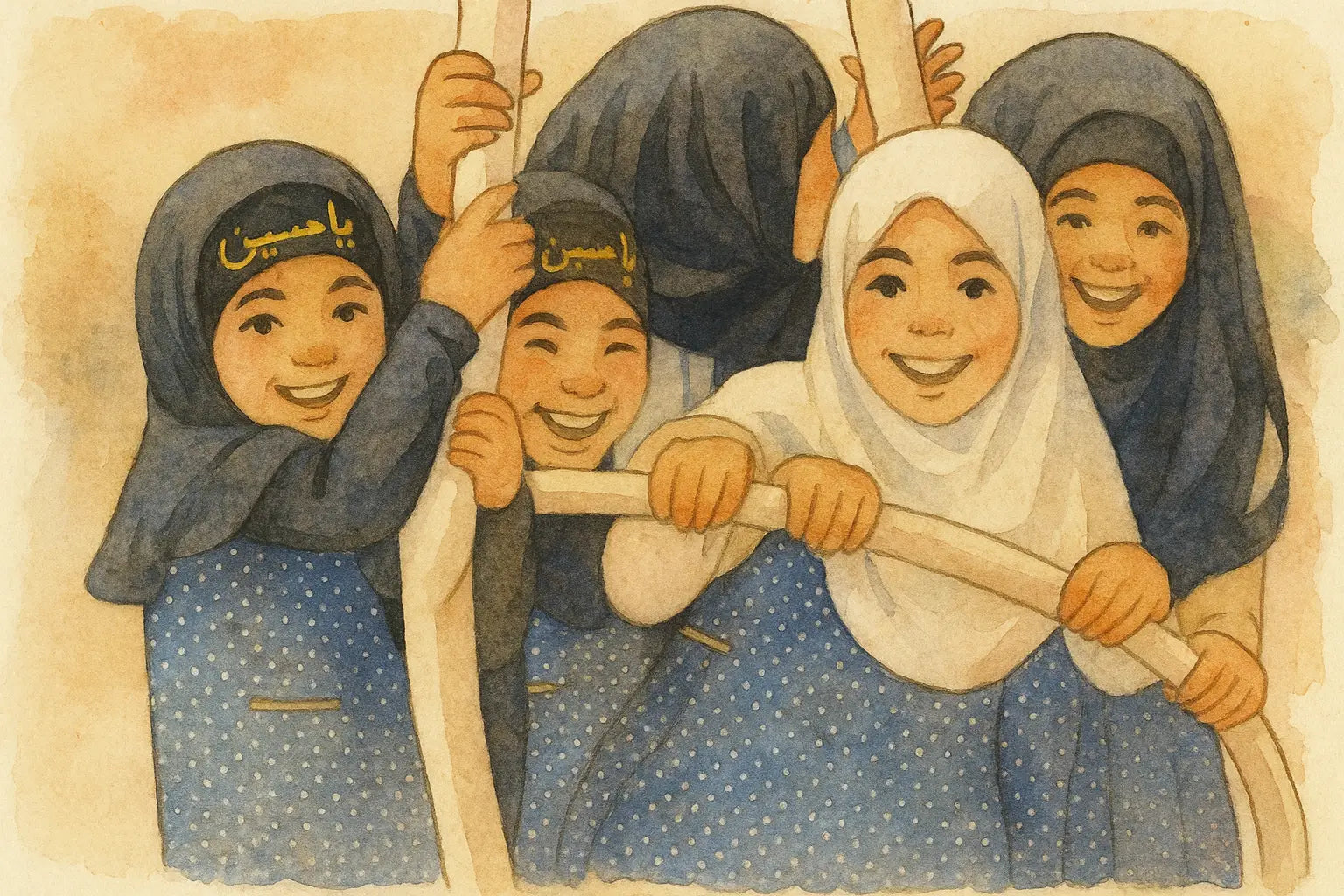Parenting has never been more challenging than in today’s era of excessive social media consumption and pervasive societal pressures. Amid these challenges, parents face the daunting task of raising well-rounded, emotionally resilient, and morally grounded children.
But here’s a question that might seem unconventional: what role can specific sports play in fostering a deeper spiritual and emotional upbringing for our kids? The answer may surprise you.
Beyond their obvious physical health and recreational benefits, these activities offer profound emotional and spiritual advantages that can help shape children into balanced and mindful individuals.
These aren’t just modern hobbies; they’re activities endorsed by one of history’s most influential figures. A prophetic narration attributed to the Holy Messenger (peace be upon him and his family) emphasizes the importance of teaching children these specific physical skills: swimming and archery—while in other traditions the Imams speak of the merits of horse-riding.
While these sports were undeniably practical for the times, their recommendation wasn’t random. Each activity is rich in physical, emotional, and psychological benefits that extend beyond the surface.
In today’s fast-paced, tech-heavy world, these timeless sports remain profoundly relevant, offering opportunities to connect with your child while equipping them with skills for life.
What is particularly remarkable is that horse-riding and archery hold such a distinguished status in Islam that they form the only exception to the prohibition of gambling. In these two sports, it is permitted for the participants themselves to stake a wager, whereby the loser compensates the winner — a unique allowance granted exclusively to these disciplines.
Islamic Traditions
Imam Ali said: The Messenger of Allah (peace be upon him and his family) said: “Teach your children swimming and archery.”1
Imam al-Ṣādiq, peace be upon him said:
The Messenger of Allah (peace be upon him and his family) said: “The right of a child upon his father, if the child is a boy, is that he should choose for him a good mother, give him a good name, teach him the Book of Allah (Mighty and Majestic), purify him, and teach him swimming.. And if it is a girl, that he should take good care of her mother, give her a good name, and teach her Sūrat al-Nūr..”2
It is narrated with a chain from our Imam Mūsā al-Kāẓim (peace be upon him), from his forefathers, that the Messenger of Allah said: “The best occupation of a believing woman is spinning thread. And he (peace be upon him) said: Teach your children archery and swimming.”3
Shaykh al-Ḥurr al-ʿĀmilī (among others) gave a juristic ruling on the recommendation (istihbāb) of archery in his work Wasāʾil al-Shīʿa. In fact, he entitled a chapter: The Recommendation of Archery and Competing in Archery, and its Preference over Horse-Riding4
Why These Sports?
The wisdom behind this guidance reflects a holistic approach to raising children. Swimming teaches survival and confidence. Archery builds focus and precision. Horse-riding fosters empathy and perseverance. Beyond their physical aspects, these activities encourage children to embrace responsibility, face their fears, and connect deeply with the world around them.For parents, teaching these sports offers more than just practical skills—it creates opportunities to bond, nurture character, and develop trust. Let’s dive into the psychological and emotional benefits that make these activities invaluable for modern parenting.
Swimming: A Gateway to Confidence and Resilience
Swimming is far more than a life-saving skill—it’s a transformative experience that builds courage and emotional strength. For children, learning to swim often starts with overcoming fear, and this journey lays the groundwork for resilience.
Psychological Benefits:
-
Stress Reduction: Swimming reduces anxiety and improves mood by promoting endorphin release and lowering cortisol5.
-
Emotional Resilience: Overcoming fear of water builds bravery and strengthens coping skills6.
-
Mindfulness: Rhythmic strokes and controlled breathing induce a meditative state, enhancing focus and calm7.
-
Self-Esteem Boost: Achievements in swimming improve confidence and self-perception, especially in children8.
For parents, guiding a child through swimming fosters patience, trust, and bonding — making it as rewarding for families as it is for the child.
Archery: Sharpening Focus and Patience in Nature
Archery may seem like a niche activity, but it holds immense benefits for a child’s mental development. This ancient skill is a masterclass in discipline and concentration.
Psychological Benefits:
-
Enhanced Focus: Archery practice improves attention control and reduces distractibility9.
-
Impulse Control: Precision aiming helps children delay gratification and manage impulsivity. Archery requires calm breathing, stillness, and sustained attention before release—essentially a mindful act10.
-
Stress Relief: The repetitive draw-and-release cycle has calming, meditative effects11.
-
Self-Discipline: Consistent training fosters perseverance and goal-oriented behavior12.
Practicing archery in natural settings also boosts mood and provides restorative contact with the outdoors — strengthening both concentration and family bonds.
Horse-Riding: Building Empathy and Confidence
Although this particular narration does not mention horse-riding among the skills parents are instructed to teach their children, numerous other traditions highlight its virtues and benefits. It is also important to remember that in the Prophet’s time, horse-riding was not merely a sport but the primary means of transport. Teaching children to ride was therefore taken for granted, much like teaching them to walk or speak — an essential life skill woven into daily existence.
Few experiences are as transformative as riding a horse. This activity goes beyond physical skills, fostering emotional growth and a profound connection with animals.
Psychological Benefits:
-
Emotional Regulation & Social Skills
Equine-assisted learning interventions, particularly for children with trauma, have shown improvements in emotional problems and social behaviors13.
Support for Neurodivergent Children
Equine-assisted therapy has shown promise in supporting children with autism, including enhancements in social interaction, motor skills, and self-regulatory behaviors14.
-
Mechanisms: Empathy, Confidence, Problem-Solving
Beyond clinical studies, narratives and practitioner observations highlight how equine-assisted therapy promotes empathy, confidence, and reflective thinking through experiential learning with horses.
What ties these three activities together is their ability to teach children resilience, patience, and emotional intelligence. They challenge children to step out of their comfort zones, embrace discipline, and connect with the world around them.
For parents, these sports offer something priceless: quality time. Teaching your child to swim, aim, or ride isn’t just about passing on skills; it’s about modeling perseverance, nurturing their confidence, and strengthening your bond.
In an age of screens and digital distractions, the timeless wisdom behind swimming, archery, and horse-riding stands out as a reminder of what truly matters: connection, growth, and the shared journey of parenthood. So, why not dive in, take aim, or saddle up? The rewards are endless, and the memories, unforgettable.
Beyond the Sports: What truly matters
As we’ve seen, the Holy Prophet of Islam instructs parents to teach their children swimming and archery — timeless skills with lasting physical and psychological benefits. Yet the Imams remind us that beyond physical training lies an even greater responsibility: to shape the hearts and minds of our children through knowledge, faith, and moral upbringing, ensuring they remain resilient against the currents of worldly distractions and misguided ideas. In his al-Khiṣāl, al-Ṣadūq reports Imam Ali (peace be upon him) — in the Hadith known as The Four Hundred — saying:
“Teach your children from our knowledge that which will benefit them by Allah’s leave, so that the Murji’ah do not overcome them with their opinions.”15
Also, in his lengthy will to Imam Hassan, the Imam elaborates on this further, saying:
“I hastened to give you this advice for several reasons: that death might overtake me before conveying it, or that worldly desires and the trials of this life might seize you, making you like an untamed animal. Indeed, the heart of a youth is like uncultivated land: whatever is sown in it will take root. So I hastened to nurture you with good manners before your heart hardens and your mind becomes occupied.”16
The Imams of the Ahlulbayt (peace be upon them) were deeply aware that every generation would face the pull of deviant ideologies and misleading opinions. In the Hadith of the Four Hundred, Imam Ali warns parents to teach their children the knowledge of the Ahlulbayt, so that misguided groups — such as the Murji’ah in his time — would not overtake them with their false reasoning. His words remind us that beliefs and ideas are not neutral: if our children are not grounded in truth, they will inevitably be swept up by the dominant currents of society. To immunize them against such influences, we must anchor them in the authentic teachings of the Prophet and his pure family, giving them clarity of vision in a world clouded with confusion.
Imam Ali’s will to Imam al-Ḥasan (peace be upon them) reinforces this urgency with a striking metaphor: “The heart of a youth is like uncultivated land — whatever is sown in it will take root.” Just as fertile soil will receive whatever seed is planted, so too will young hearts absorb the ideas placed before them. If we sow the words of the Ahlulbayt early, before the soil hardens, we equip our children with discernment and resilience. In today’s world, where ideologies spread faster than ever through media and peer influence, this early nurturing is not optional — it is a shield. By teaching our children the hadiths of the Ahlulbayt, we are not simply giving them information; we are inoculating them with guidance that can resist the infections of doubt, misguidance, and moral compromise.
قال أمير المؤمنين (ع): قال رسول الله: «علِّموا أولادكم السباحة، والرماية»—الكافي ج6 ص47
عن أبي عبد الله (ع) قال: «..قال رسول الله (ص): حقّ الولد على والده إذا كان ذكراً أنْ يستفره أمّه، ويستحسن اسمه، ويعلِّمه كتاب الله (عزَّ وجلَّ)، ويطهِّره، ويعلَّمه السباحة، وإذا كانت أُنثى أنْ يستفره أمَّها، ويستحسن اسمها، ويعلِّمها سورة النور...الحديث» — تهذيب الأحكام ج8 ص112
بالإسناد عن إمامنا الكاظم عن آبائه، قال: «قال رسول الله : نعم شغل المرأة المؤمنة الغزل. وقال (ص): علِّموا أبناءَكم الرمي والسباحة» — الجعفريات ص98
Wasāʾil al-Shīʿa, vol. 13, p. 347
Tang Z, Wang Y, Liu J, Liu Y, Effects of aquatic exercise on mood and anxiety symptoms: A systematic review and meta-analysis, Front Psychiatry, 2022
Masten A, Resilience of children in disasters: A Multisystem Perspective, International Journal of Psychology, 2021
K. Overbury, B.W. Conroy, E. Marks, Swimming in nature: A scoping review of the mental health and wellbeing benefits of open water swimming, Journal of Environmental Psychology, Volume 90, 2023
Sajadian, M & Mehr, M, The Effect of Swimming Skill Education on Self-Esteem and Compatibility of Boy's Primary School Students. Procedia - Social and Behavioral Sciences, 2011
L.K.A. Hussain, A.S. Rambely, and N.A. Noh, Effectiveness of Archery Training on Attention and Cognitive Function: An Electroencephalography (EEG) Study, ASM Science Journal, Volume 20(1), 2025
Klingberg, T. Training and plasticity of working memory. Trends in Cognitive Sciences, 14(7), 317–324, 2010
Tao, J., et al. Attention network function in elite shooting and archery athletes with and without mindfulness training. Frontiers in Psychology, 12, 638822, 2021
Wang D, Hu T, Luo R, Shen Q, Wang Y, Li X, Qiao J, Zhu L, Cui L, Yin H. Effect of Cognitive Reappraisal on Archery Performance of Elite Athletes: The Mediating Effects of Sport-Confidence and Attention. Front Psychol. 2022
Hopson, L.M., McGraw, K., Traylor, A.C. et al. Equine-Assisted Learning for Children with Trauma and their Caregivers. Journal of Child & Adolescent Trauma, 2025
Peters, B. C. M., & Wood, W, Autism and equine-assisted interventions: A systematic mapping review. Review Journal of Autism and Developmental Disorders, 4(2), 157–174, 2017
علي بن موسى بن طاووس في كتاب ( كشف المحجة لثمرة المهجة ) : نقلاً من كتاب ( الرسائل ) لمحمد بن يعقوب الكليني بإسناده إلى جعفر بن عنبسة ، عن عباد بن زياد الاسدي ، عن عمرو بن أبي المقدام ، عن أبي جعفر ( عليه السلام ) في وصية أمير المؤمنين ( عليه السلام ) لولده الحسن ( عليه السلام ) ـ وهي طويلة منها أن قال ـ : فبادرتك بوصيتي لخصال منها : ( أن تعجل ) (1) بي أجلي ـ إلى أن قال : ـ وأن يسبقني إليك بعض غلبة الهوى وفتن الدنيا وتكون كالصعب النفور ، وإنما قلب الحديث كالارض الخالية ما القي فيها من شيء (2) قبلته ، فبادرتك بالادب قبل أن يقسو قلبك ويشتغل لبك .








Leave a comment